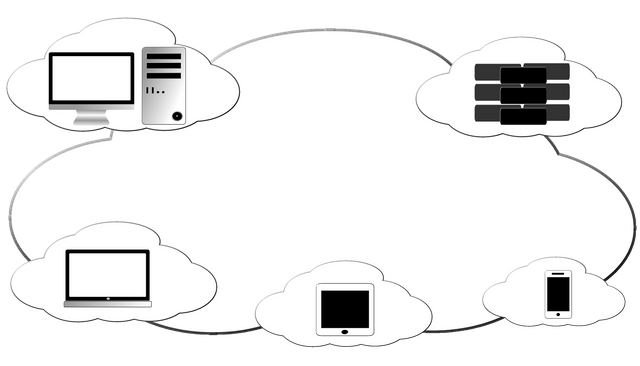How to Use NAS Storage in Azure

Image Source: Pixabay
Data storage has not changed significantly over the last 20 years. The only exception is the growing amount of user-generated data. Network Attached Storage (NAS) makes data more accessible to network devices by giving a single access point for storage. NAS protocols have built-in management, security, and fault-tolerance capabilities.
When you combine cloud storage with NAS, you can reduce the amount of data you have to manage without the need for complex hardware solutions. Moreover, NAS in the cloud can reduce cloud migration time.
What Is Cloud NAS?
Cloud-based NAS helps you address storage needs in the cloud using the same concepts as an on-premises NAS. As a result, organizations can scale up storage performance without making major changes to their existing processes and application.
A cloud NAS works like the on-premises, legacy NAS systems installed in a lot of data centers. The difference is that a cloud-based NAS is not a physical machine. Cloud NAS is a virtual appliance designed to leverage cloud computing benefits to improve the storage functionality of hardware NAS. Most cloud NAS solutions work in public cloud environments like Azure file storage and Amazon Web Services (AWS).
How Does NAS Work?
NAS software is deployed on a Virtual Machine (VM) in the cloud with a lightweight operating system. This VM is essentially acting just like a server that connects the user to cloud storage volumes. NAS VMs send and receive only two types of requests—file sharing and data storage. As opposed to traditional servers that send thousands of requests every second, and only a fraction of these requests are related to storage.
A NAS VM is formatted with data transfer protocols that enable you to access files on another machine. The two most fundamental network protocols are Internet Protocol (IP) and Transmission Control Protocol (TCP). The TCP protocol combines data into packets before they are sent via an IP. TCP packets are like compressed zip files and IPs are email addresses.
Cloud NAS Service Benefits
NAS can be an important element of cloud storage in Infrastructure-as-a-Service (IaaS) offerings. Here are the main benefits of NAS in the cloud:
- Performance flexibility—cloud NAS enables you to use different storage options in the cloud. You can use low performance object storage when your project does not require high performance. You can also use High-Performance Computing (HPC) for compute-intensive projects.
- Legacy NAS upgrades—hardware NAS systems are usually locked by long-term contracts. As a result, you have to pay for hardware upgrades when something changes or you have an unexpected project. Cloud NAS enables you to create the required storage when you need it without signing long-term contracts.
- Built-in disaster recovery—disaster recovery is the ability of a network, server, or storage system to recover and continue operating after a failure like a power outage. Most public cloud providers offer disaster recovery services. Disaster recovery does not replace the need for high availability, backups, and snapshots. NAS systems get built-in disaster recovery services when operating in the cloud.
- Reduced costs—cloud providers enable you to move legacy data to low-cost tiered storage and store frequently-accessed data in top-tiered storage to maintain performance. As a result, you can scale your cloud instances to best suit your needs.
Cloud NAS Use Cases
Cloud NAS solutions offer many different services beyond just storing data in the cloud. The following list reviews the most common use cases of a cloud-based NAS solution.
1. Backup and archive
Cloud NAS gives you the limitless storage capacity of the cloud to archive and backup data. In addition, you can reduce storage costs with flexible Service-Level Agreements (SLA) for cloud-based archive data.
You can compare prices and performance requirements to get the best offer. You can use archive-level object storage if your SLA requires you to retrieve data every couple of days. Another option is to use high-performance storage if you cannot wait.
2. File services
Compliance regulations usually force you to keep multiple copies of data for long periods of time. Cloud NAS solutions can automatically move compliance copies of files to less expensive long-term cloud storage. This file-sharing capability can support necessary file access protocols for Windows, Linux, and Apple users.
3. High-performance computing (HPC)
HPC is becoming the standard for performance-intensive tasks like Artificial Intelligence (AI) applications. You can get the same amount of virtual machines in the cloud as on-premises. However, you also need to meet HPC SLAs for storage.
Cloud-based NAS can provide 10s and even 100s of thousands of Input/Output Operations per Second (IOPS) with large throughput for both compute and storage. As a result, the performance of cloud resources increases, and you can use the power of HPC as needed.
4. Cloud migration
Traditional applications usually do not support native cloud storage interfaces. As a result, you need to redesign your applications to support cloud infrastructure when migrating to the cloud. The redesign process often gets complex and expensive.
Cloud NAS can offer the required file services and support for Network File System (NFS), Server Message Block (SMB), and Internet Small Computer Systems Interface (iSCSI), protocols, along with Active Directory (AD) integration when migrating legacy applications.
5. Development and DevOps
The flexibility of the cloud enables developers and DevOps engineers to quickly set up new NAS infrastructure for a new project. You can also bring the infrastructure down when you no longer need it, since there are no long-term storage contracts. Developers always have the required storage performance for their development and Proof of Concept (POC) projects when using NAS in the cloud.
Conclusion
NAS by itself is not a cloud. Cloud environments pool, abstract, and share scalable resources across a network. NAS can be an important part of any cloud environment, especially when you use Infrastructure-as-a-Service (IaaS) services to deliver storage to clients.